11 hours ago
Information Cutoff: 2:00 pm ET
The Iran Update provides insights into Iranian and Iranian-sponsored activities abroad that undermine regional stability and threaten US forces and interests. It also covers events and trends that affect the stability and decision-making of the Iranian regime. The Critical Threats Project (CTP) at the American Enterprise Institute and the Institute for the Study of War (ISW) provides these updates regularly based on regional events. Click here to see CTP and ISW’s interactive map of Israeli ground operations. This map is updated daily alongside the static maps present in this report.
CTP-ISW defines the “Axis of Resistance” as the unconventional alliance that Iran has cultivated in the Middle East since the Islamic Republic came to power in 1979. This transnational coalition is comprised of state, semi-state, and non-state actors that cooperate to secure their collective interests. Tehran considers itself to be both part of the alliance and its leader. Iran furnishes these groups with varying levels of financial, military, and political support in exchange for some degree of influence or control over their actions. Some are traditional proxies that are highly responsive to Iranian direction, while others are partners over which Iran exerts more limited influence. Members of the Axis of Resistance are united by their grand strategic objectives, which include eroding and eventually expelling American influence from the Middle East, destroying the Israeli state, or both. Pursuing these objectives and supporting the Axis of Resistance to those ends have become cornerstones of Iranian regional strategy.
We do not report in detail on war crimes because these activities are well-covered in Western media and do not directly affect the military operations we are assessing and forecasting. We utterly condemn violations of the laws of armed conflict and the Geneva Conventions and crimes against humanity even though we do not describe them in these reports.
Israeli Prime Minister Benjamin Netanyahu’s Office recently gave US officials a document detailing Israel’s conditions for a ceasefire and diplomatic solution to end the war with Hezbollah. Axios reported that Israel insisted that the Israel Defense Forces (IDF) be allowed to engage in “active enforcement” to prevent Hezbollah from rearming and rebuilding infrastructure near the Israel-Lebanon border.[i] Israel also demanded that the IDF Air Force enjoy “freedom of operation” in Lebanese airspace.[ii] US special envoy Amos Hochstein arrived in Beirut on October 21 to discuss Israel’s conditions with senior Lebanese officials.[iii]
Lebanon, the United Nations, and the international community are highly unlikely to accept any Israeli conditions that would allow for continued Israeli operations in Lebanese territory, according to US officials.[iv] Hezbollah is equally unlikely to accept these conditions, and Hezbollah leadership has previously indicated that it remains unwilling to agree to a separate deal that does not include an end to Israeli operations in the Gaza Strip.[v] This would rule out an agreement to return to UNSC Resolution 1701 without a ceasefire in the Gaza Strip.[vi] An unspecified Israeli official said that Israel’s conditions resemble UN Resolution 1701 with “increased enforcement.”[vii]
UNIFIL has largely failed to undertake the tasks given to it under its mandate. The UN Interim Force in Lebanon (UNIFIL) is present in southern Lebanon to monitor the implementation of UN Resolution 1701 and to “take all necessary action” to prevent the area from being used for hostile activities, which would include Hezbollah‘s extensive development of military infrastructure.[viii] CTP-ISW has previously stated that Netanyahu’s demand to prevent Hezbollah’s reorganization and rearmament are provisions that are already in part enshrined in UN Resolution 1701 and should have been enforced by UNIFIL.[ix] UNIFIL has failed to execute this mandate and prevent Hezbollah from re-establishing military infrastructure south of the Litani River. US officials, such as Amos Hochstein, have reportedly expressed interest in amending UN Resolution 1701 by expanding the deployment of the Lebanese Armed Forces (LAF) in southern Lebanon.[x] Increasing the LAF’s force size is unlikely to enable the LAF to better enforce UN Resolution 1701, however, if Lebanese soldiers and their government (of which Hezbollah is a part) are unwilling to prevent Hezbollah fighters from operating in the area.
The IDF is attempting to erode the Lebanese Shia community’s support for Hezbollah by targeting a Hezbollah-affiliated financial institution in Lebanon. The IDF Air Force conducted airstrikes targeting at least nine branches of al Qard al Hassan in Beirut’s southern suburbs and across Lebanon on October 20.[xi] Al Qard al Hassan is one of Hezbollah’s main financial assets in Lebanon, providing financial services such as loans or ATM deposits and withdrawals to over 300,000 members of Lebanon‘s Shia population.[xii] Israeli Army Radio reported that al Qard al Hassan also manages Hezbollah’s banking system, including its payroll for Hezbollah fighters.[xiii] Al Qard al Hassan reportedly receives direct funding from Iran.[xiv] Lebanese sources reported that the IDF targeted al Qard al Hassan branches in Laylaki, Chiyah, and Burj al Barajneh in Beirut’s southern suburbs and in Nabatieh, Tyre, Shehabieh, Baalbek, Hermel, and Rayak, in southern Lebanon and the Bekaa Valley.[xv] An unspecified senior Israeli official said that the objective of Israel’s ”broad wave of attacks” targeting al Qard al Hassan is to undermine Hezbollah’s economic stability and erode the trust that the Lebanese Shia community, including Hezbollah’s rank-and-file, holds in Hezbollah.[xvi] This will degrade Hezbollah’s ability to function during the war and ability to “rebuild and rearm on the day after,” according to the Israeli official.[xvii] Prime Minister Benjamin Netanyahu has previously expressed that Israel seeks to obtain a postwar agreement that would prevent Hezbollah from reorganizing and rearming and from continuing to threaten Israel in the long term.[xviii]
The IDF’s effort to erode the Shia population’s trust in Hezbollah is consistent with previous Israeli efforts to do so. Netanyahu recently asked the Lebanese people to “take back [their] country” from Hezbollah, for example.[xix] It is unclear at this time if this strategy has successfully diminished public support for Hezbollah in Lebanon.
The IDF conducted an airstrike targeting a senior member of Lebanese Hezbollah’s financial system in Damascus, Syria, on October 21.[xx] IDF Spokesperson Rear Admiral Daniel Hagari stated that the IDF targeted the head of Hezbollah’s financial arm responsible for “funneling cash from Iran to Hezbollah.”[xxi] Hagari did not state the specific individual’s name or position but stated that the individual had only been in the position for a “few weeks since his predecessor was killed.” IDF has conducted various strikes targeting the Hezbollah financial system in Lebanon in recent days. Syrian state media stated that the airstrike killed at least two people.[xxii]
Military officials assessed that IDF operations have destroyed around two-thirds of Hezbollah’s rocket capabilities since the IDF began ground operations on September 30.[xxiii] The IDF Northern Command said that Hezbollah continues to fire from its ”residual rocket capabilities” but that this is not ”significant” fire.[xxiv] The IDF air campaign has concentrated its efforts on targeting Hezbollah rocket assets and weapons stockpiles. Degrading Hezbollah’s rocket assets is a necessary step to remove the threat that Hezbollah poses to northern Israeli towns. Hezbollah has continued to fire large barrages of daily rockets into northern and central Israel despite IDF operations targeting its rocket capabilities, however.[xxv] Hezbollah launched over 170 rockets on October 20, for example.[xxvi] An Israeli think tank reported that Hezbollah’s daily average of fire into Israel is four times greater than the daily average before Israel’s ground operations.[xxvii]
Israeli military officials indicated that the IDF expects to finish its initial phase of ground operations in southern Lebanon within a few weeks and would soon achieve the conditions to return northern residents to their homes.[xxviii] Israeli forces have raided and seized terrain in border towns and areas over the past three weeks to prevent Hezbollah direct fire attacks and ground attacks into Israel, supporting the stated Israeli war aim of returning Israeli civilians to the north.[xxix] While these raids have led to the likely severe degradation of Hezbollah capabilities in border towns, it is unclear how IDF strikes deeper into Lebanon have succeeded in degrading Hezbollah’s longer-range rocket and missile assets. These capabilities will continue to threaten residents of northern and central Israel.
The IDF has seized several hills and villages in southern Lebanon that would allow Hezbollah artillery observers to support indirect fire attacks into Israel. Hezbollah fired rockets targeting Israeli forces on Jabal Kahil on October 20, north of Maroun el Ras, indicating that Israeli forces had seized and were operating on the hill.[xxx] The IDF has similarly seized hills in Mays al Jabal, Odaisseh, and Blida. A Hezbollah-affiliated correspondent reported that Israeli forces have conducted operations in some border villages that are only visible from Israeli territory and ”not seen” by Hezbollah forces. These positions on hills and in towns overlooking northern Israel would enable Hezbollah artillery observers to support rocket and mortar attacks into northern Israel. The correspondent claimed that Hezbollah fighters have conducted rocket attacks that have deterred Israeli forces from seizing the ”second line” of border towns.[xxxi] Israeli forces have entered one “second-line“ village but have not attempted to seize other ” second-line” towns.[xxxii] The fact that Israeli forces have entered one of these villages indicates that the IDF is not ”deterred.” It is highly unlikely that intermittent shelling would deter a combat-experienced force such as the IDF units operating in southern Lebanon.
Iran is attempting to use spies in Israel to observe Israeli military facilities and possibly to support targeting efforts. The Shin Bet and Israeli police arrested seven Israeli Jewish citizens of Azeri heritage in Haifa and northern Israel on charges of espionage for “hundreds of tasks” for Iranian intelligence agencies in a counterintelligence operation.[xxxiii] The suspects had been in contact with Iranian agents, and the Israeli State Attorney’s Office called this the most serious case they have investigated in recent years.[xxxiv] The suspects were reportedly recruited using financial inducements that were routed through Russian intermediaries who traveled to Israel.[xxxv]
The suspects reportedly photographed and collected information on key sites in Israel, indicating that Iran may have been using these suspects to support effective targeting of Israel with missiles and drones. Prosecutors stated that police and the Shin Bet accused the suspects of photographing and collecting information on Israeli energy and port infrastructure, IDF base and facilities, including the Kirya defense headquarters in Tel Aviv, Nevatim and Ramat David air bases, and Iron Dome battery sites, for Iran for around two years.[xxxvi] The suspects’ handlers also sent maps of certain sites to the suspects, including a map of the Golani Training Base, which Hezbollah struck with a drone on October 13.[xxxvii] The fact that the base’s dining facility was struck at dinner time with a Hezbollah drone suggests that some intelligence asset had observed patterns of life and understood the exact layout of the base and specific buildings within the base. Hezbollah has also targeted Iron Dome batteries with drone attacks, which this Iranian-led intelligence effort may have enabled.
US Secretary of Defense Lloyd Austin stated on October 21 that the US Terminal High Altitude Area Defense (THAAD) anti-missile system in Israel is “in place.”[xxxviii] Austin declined to confirm if the anti-missile system was fully operational but said that it could be put into operation ”very quickly.” The US deployed the THAAD anti-missile system and US military personnel to operate the system to Israel on October 13 to bolster Israeli air defenses following the April 13 and October 1 Iranian attacks on Israel. Secretary of State Antony Blinken is set to meet with Israeli Prime Minister Benjamin Netanyahu in Jerusalem on October 22.[xxxix]
The White House National Security spokesperson claimed that armed gangs and criminal groups are preventing humanitarian aid from entering the Gaza Strip, suggesting that Hamas control over internal security and governance in the southern Gaza Strip is weakened. White House spokesperson John Kirby claimed that armed gangs and criminal groups are preventing humanitarian aid from entering the Gaza Strip through the Kerem Shalom border crossing, which connects Israel and Rafah Governorate.[xl] The presence of armed gangs and criminal groups controlling the flow of aid could indicate decreasing Hamas internal control and governance capabilities, given that controlling the movement of humanitarian aid and distributing it to Hamas supporters is one way by which Hamas could maintain control in the Gaza Strip. Armed gangs and criminal groups could still cooperate with Hamas, however. Kirby noted that Israel had allowed 120 trucks of aid into the Gaza Strip over the last few days. Israeli Prime Minister Benjamin Netanyahu ordered an increase in humanitarian aid into the Gaza Strip to 250 trucks per day on October 19.[xli] Netanyahu’s decision followed a letter from the United States to senior Israeli officials on October 13 warning that the Biden administration would be forced to take unspecified steps, implying the withholding of military aid to Israel, if aid was not delivered to non-combatants in the Gaza Strip.[xlii]
Key Takeaways:
- Israeli Goals in Lebanon: Israeli Prime Minister Benjamin Netanyahu’s Office recently gave US officials a document detailing Israel’s conditions for a ceasefire and diplomatic solution to end the war with Hezbollah. Lebanon, the United Nations, and the international community are highly unlikely to accept any Israeli conditions that would allow for continued Israeli operations in Lebanese territory, according to US officials.
- Israeli Air Campaign: The IDF is attempting to erode the Lebanese Shia community’s support for Hezbollah by targeting a Hezbollah-affiliated financial institution in Lebanon. The IDF separately conducted an airstrike targeting a senior member of Lebanese Hezbollah’s financial system in Damascus, Syria, on October 21.
- Israeli Military Assessments of Ground Operations: Israeli military officials assessed that IDF operations have destroyed around two-thirds of Hezbollah’s rocket capabilities since the IDF began ground operations on September 30. Israeli military officials indicated that the IDF expects to finish its initial phase of ground operations in southern Lebanon within a few weeks and would soon achieve the conditions to return northern residents to their homes.
- Israeli Ground Operation in Lebanon: The IDF has seized several hills and villages in southern Lebanon that would allow Hezbollah artillery observers to support indirect fire attacks into Israel.
- Iranian Intelligence Efforts in Israel: Iran is attempting to use spies in Israel to observe Israeli military facilities and possibly to support targeting efforts. Israel arrested seven suspects who reportedly photographed and collected information on key sites in Israel for Iranian handlers, indicating that Iran may have been using these suspects to support effective targeting of Israel with missiles and drones.
- Gaza Strip: The White House National Security spokesperson claimed that armed gangs and criminal groups are preventing humanitarian aid from entering the Gaza Strip, suggesting that Hamas control over internal security and governance in the southern Gaza Strip is weakened.
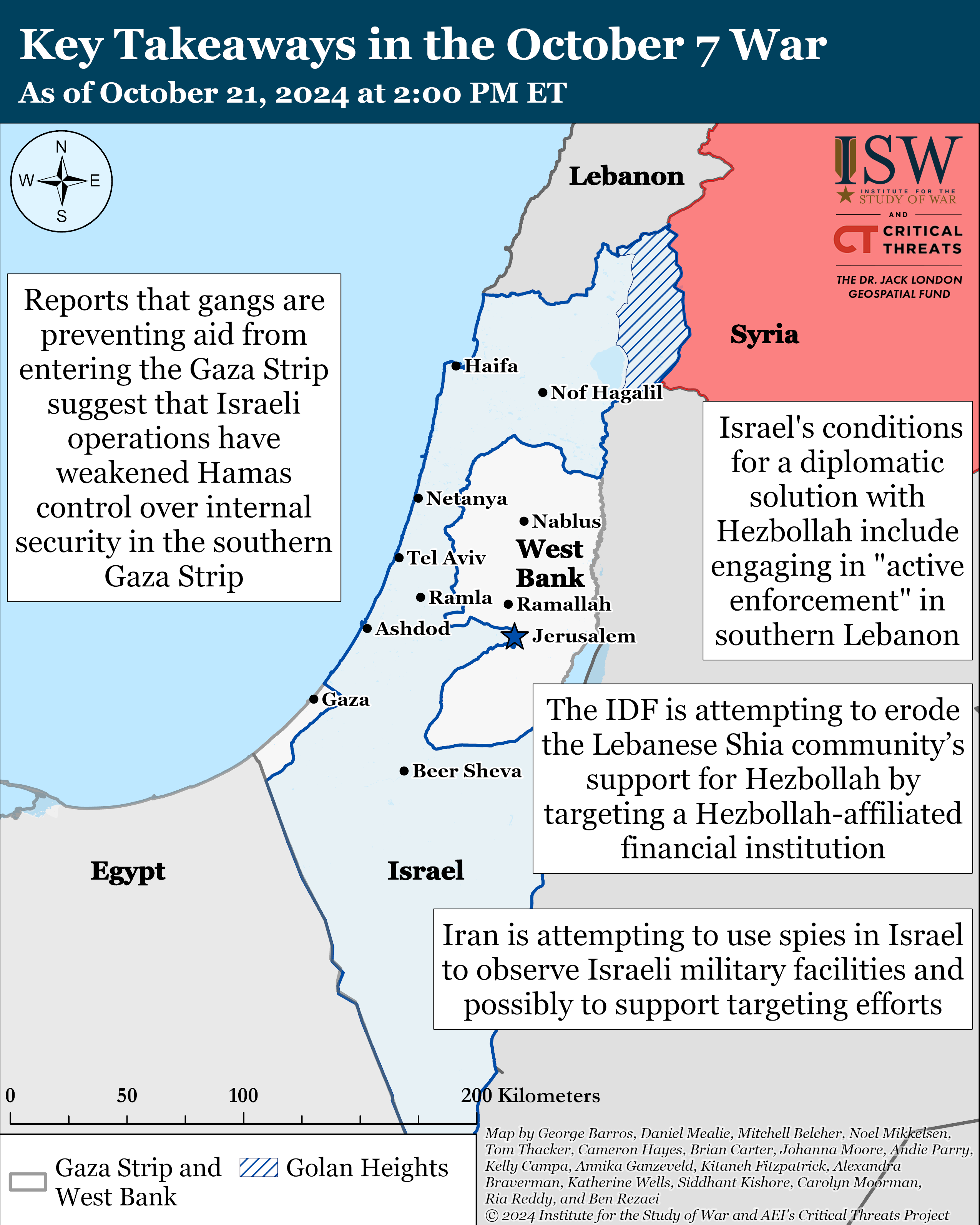
Gaza Strip
Axis of Resistance objectives:
- Erode the will of the Israeli political establishment and public to sustain clearing operations in the Gaza Strip
- Reestablish Hamas as the governing authority in the Gaza Strip
The IDF 162nd Division continued operations near Jabalia in the northern Gaza Strip on October 20.[xliii] IDF forces killed dozens of Palestinian fighters and destroyed militia infrastructure and tunnel shafts. The 401st Armored Brigade killed multiple Palestinian fighters who posed a threat to Israeli forces via tank fire, direct engagement, and directing airstrikes.[xliv] Hamas conducted six rocket-propelled grenade attacks targeting Israeli armor near Jabalia.[xlv]
Palestinian militias conducted two attacks targeting Israeli command-and-control sites along the Netzarim Corridor on October 21. [xlvi] The al Aqsa Martyrs’ Brigade also mortared an Israeli command-and-control site north of Gaza City. [xlvii]
The IDF 252nd Division continued operations in the central Gaza Strip on October 20.[xlviii] IDF forces destroyed militia infrastructure and a weapons depot. A Palestinian journalist reported gunfire from vehicles north of al Bureij and Nuseirat refugee camps.[xlix] The IDF 252nd Division resumed clearing operations in those camps on October 17, after last operating in the central Gaza Strip on October 8. [l]
The IDF 143rd Division killed multiple fighters who posed a threat to Israeli forces in Rafah on October 20. [li]
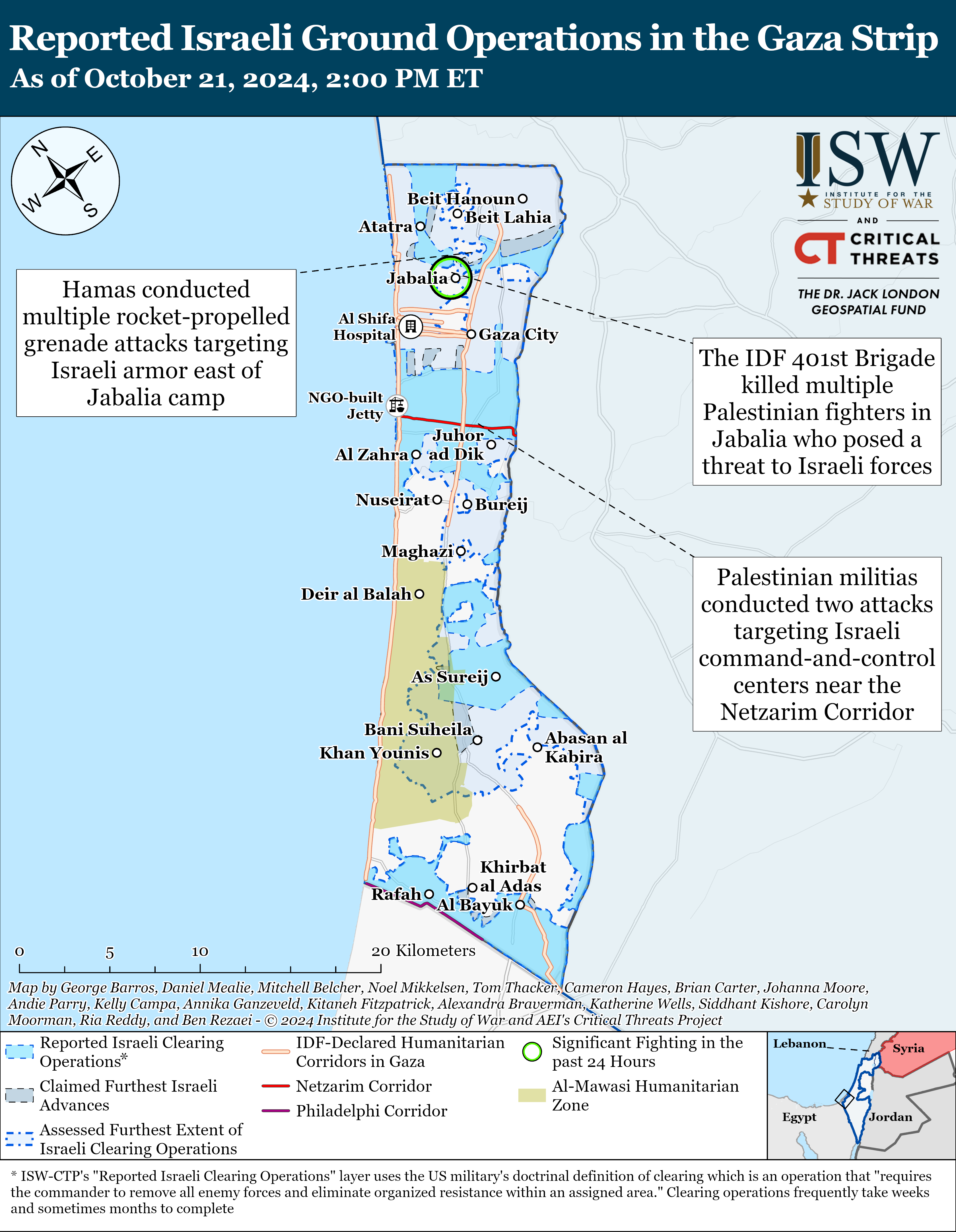
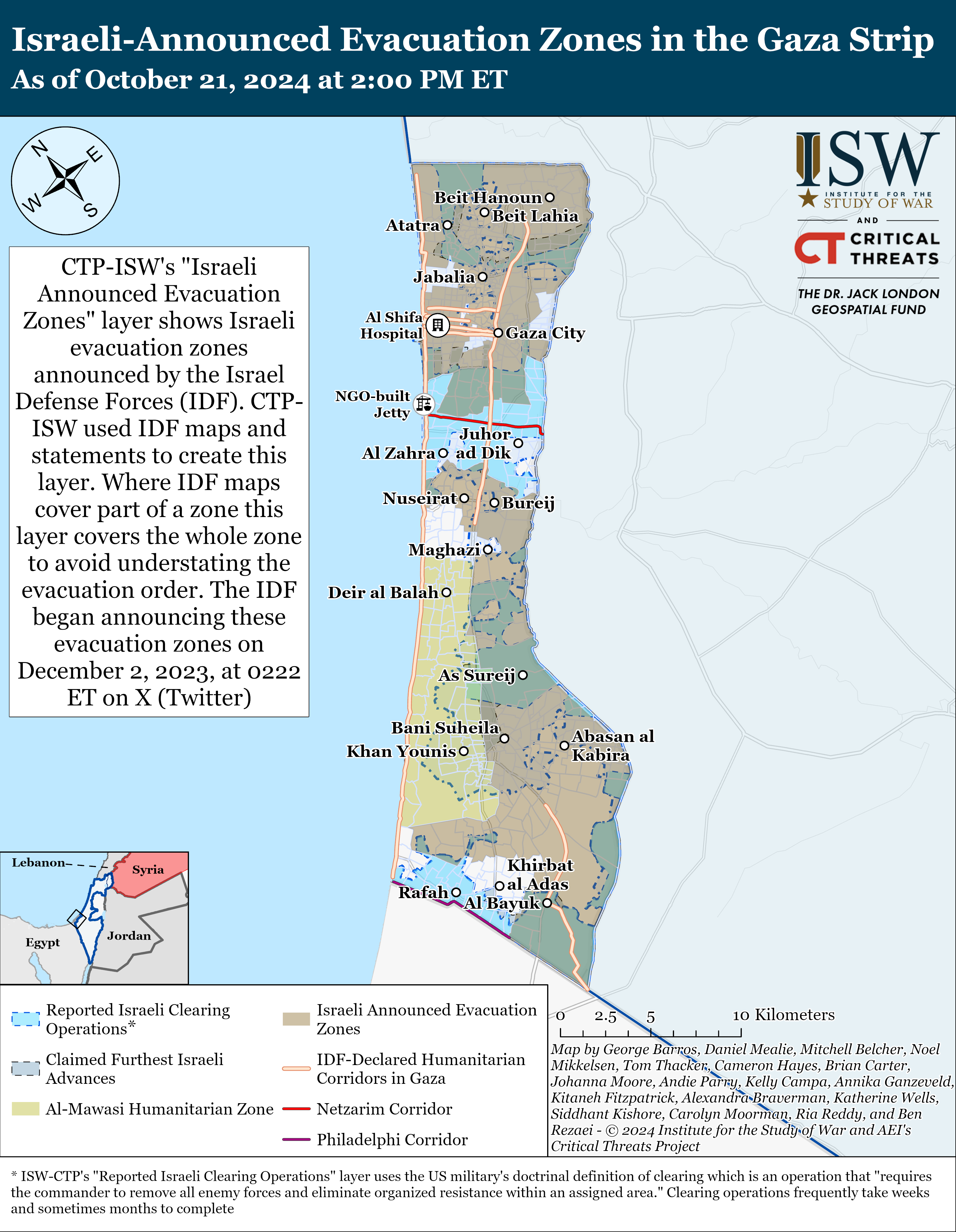
The National Resistance Brigades and the Popular Resistance Committees conducted one indirect fire attack targeting Israeli forces east of Jabalia on October 21.[lii] The IDF intercepted one rocket that crossed from the northern Gaza Strip.[liii]
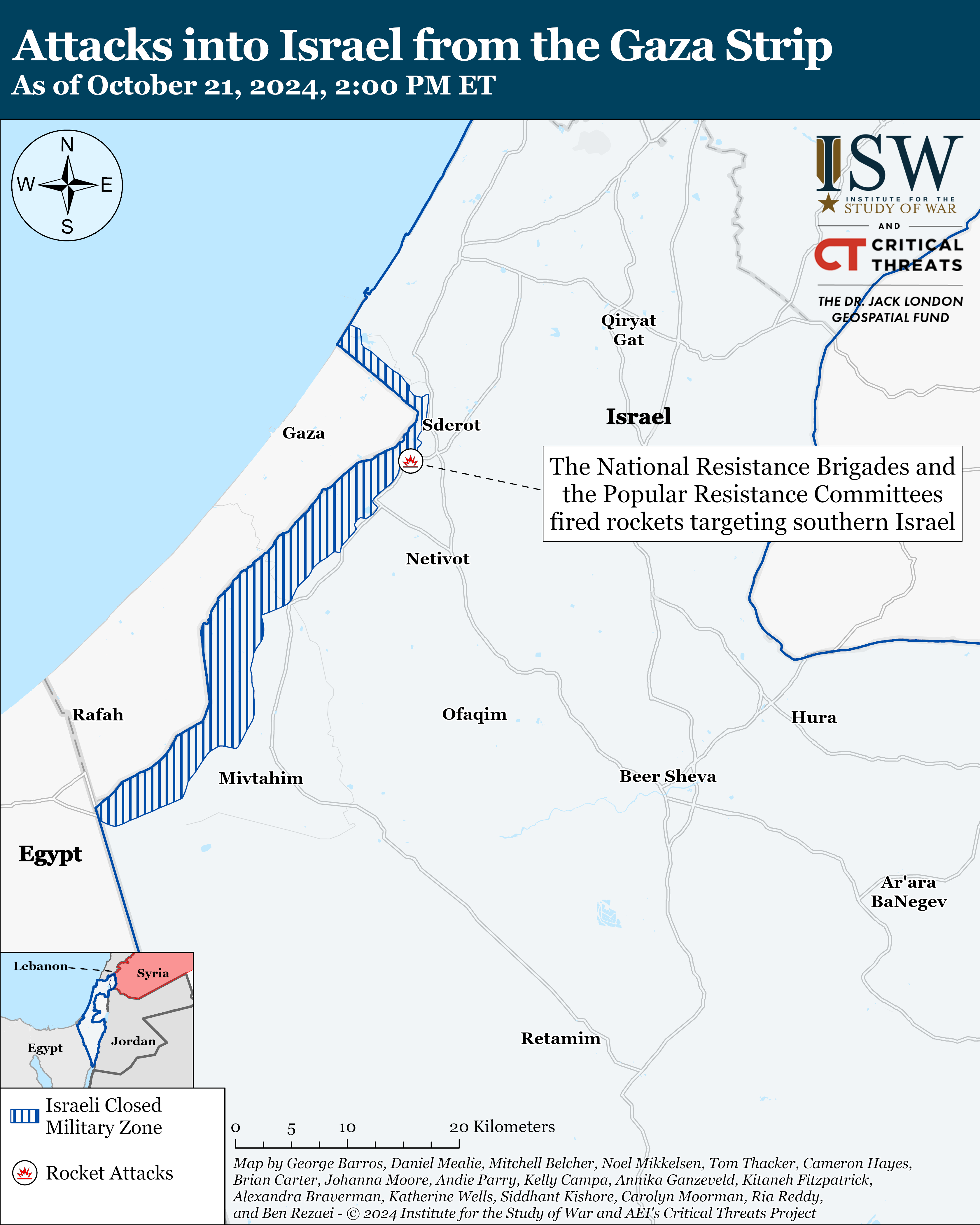
West Bank
Axis of Resistance objectives:
- Establish the West Bank as a viable front against Israel
CTP-ISW did not record any engagements between Israeli forces and Palestinian fighters in the West Bank since CTP-ISW’s data cut-off on October 20. An unspecified Palestinian fighter threw Molotov cocktails and a burning tire at the Israeli settlement of Midgal Oz in the West Bank on October 20.[liv] Israeli settlement protection forces arrested the individual and turned him over to Israeli security forces. Israeli security forces conducted a “battalion-sized” operation in Deir Abu Mashaal, Ramallah Governorate, and arrested 15 wanted individuals.[lv]
Northern Israel and Lebanon
Axis of Resistance objectives:
- Prepare for an expanded and protracted conflict with Israel in the near term
- Expel the United States from Syria
The IDF 98th Division continued operations in Markaba and other southeastern Lebanese towns.[lvi] Commercially available satellite imagery captured on October 20 showed flattened terrain and vehicle tracks in northern Markaba, indicating that Israeli forces operated in the area. The 98th Division killed several Hezbollah fighters in the past day, including tactical-level commanders and a cell of fighters that fired an anti-tank guided missile at Israeli forces.[lvii] Hezbollah conducted multiple attacks targeting the 98th Division on October 21. Hezbollah fighters fired multiple salvos of rockets targeting Israeli forces operating east of Markaba.[lviii] Hezbollah claimed that it targeted Israeli personnel who were attempting to evacuate killed and injured soldiers.[lix] Hezbollah also mortared Israeli forces at the Kfar Kila crossing, and Hezbollah-affiliated media reported that Hezbollah targeted Israeli personnel west of Odaisseh.[lx]
The IDF 91st Division continued operations in southern Lebanon on October 21.[lxi] Commercially available satellite imagery showed flattened terrain and vehicle tracks roughly one kilometer south of Nabi Youchaa, suggesting that Israeli forces operated in the area. The 91st Division directed an airstrike that struck and killed a cell of Hezbollah fighters that fired rockets targeting northern Israel.[lxii] Hezbollah fired rockets targeting Israeli forces moving on Jabal Kahil, northeast of Maroun al Ras.[lxiii]
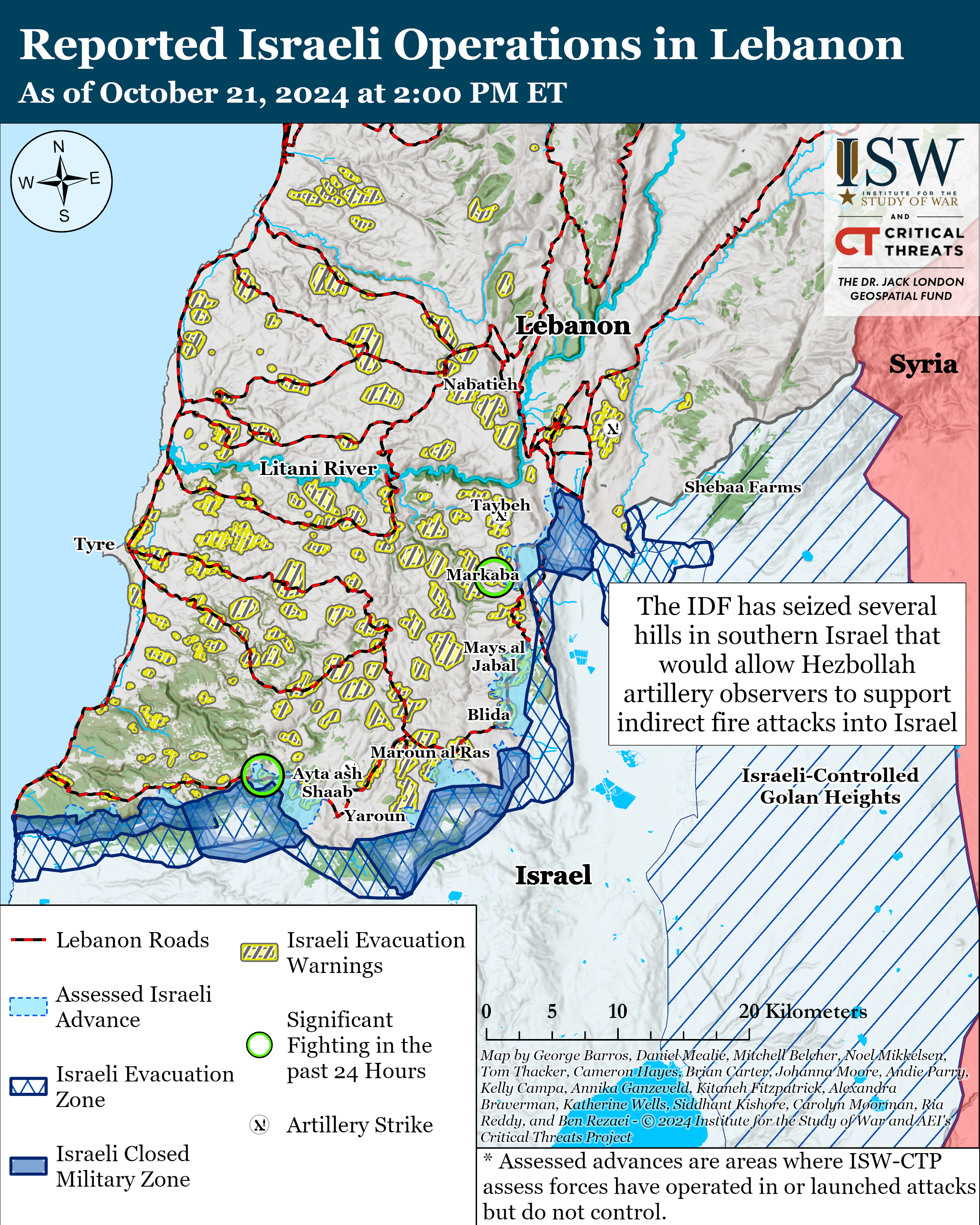
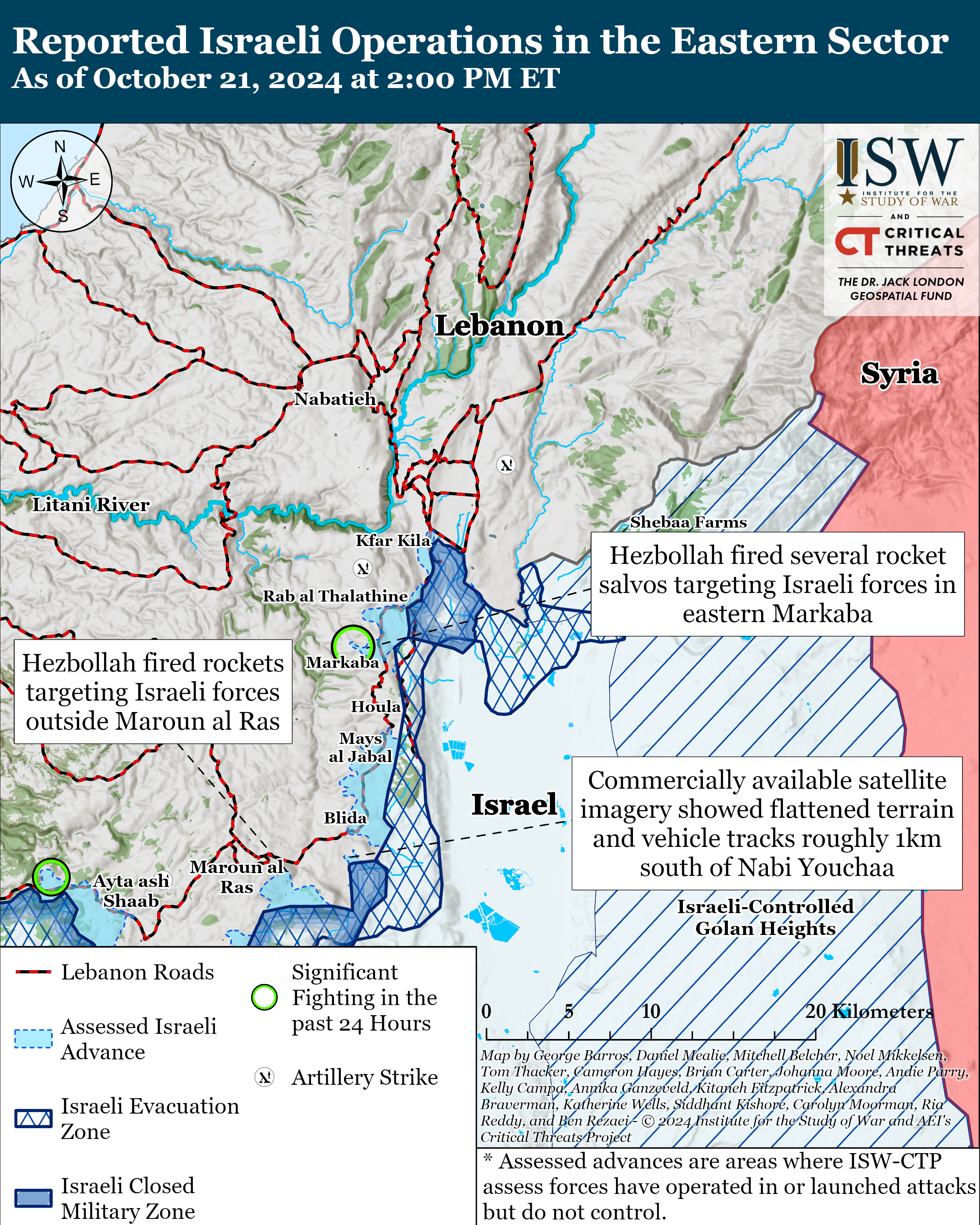
The IDF 36th Division continued operations in southern Lebanon on October 21.[lxiv] The 36th Division located underground infrastructure and anti-tank guided missile launchers aimed at northern Israeli towns.[lxv] Israeli forces also directed airstrikes targeting Hezbollah fighters.[lxvi] The IDF 188th Armored Brigade killed fighters and located and destroyed underground infrastructure and weapons caches in southern Lebanon.[lxvii] The 188th Armored Brigade located a munitions warehouse in the “heart” of a residential neighborhood.[lxviii] Israeli forces found dozens of long- and short-range missiles, ammunition, small arms, explosives, and medical equipment.[lxix] The 188th Armored Brigade also located and destroyed a loaded rocket launcher mounted on a vehicle.[lxx] Hezbollah fired rockets targeting Israeli forces in Aita al Shaab.[lxxi]
The IDF 146th Division continued operations in southwest Lebanon on October 21.[lxxii] The 146th Division located and destroyed underground Hezbollah infrastructure and weapons caches, including anti-tank guided missiles and an anti-tank launcher aimed at northern Israel.[lxxiii]
IDF special operations forces continued to operate in southern Lebanon.[lxxiv] The IDF Maglan and Egoz units are both currently deployed in southern Lebanon to support ground operations.[lxxv] Israeli special operations forces prepared explosive-laden drones to target and destroy Hezbollah anti-tank positions and headquarters.[lxxvi] Israeli special operations forces also located a warehouse containing dozens of rockets, a grenade launcher, vests, helmets, and other combat equipment. [lxxvii] Egoz Unit fighters operated with the 36th Division near Aita al Shaab and Ramyeh on October 20.[lxxviii]
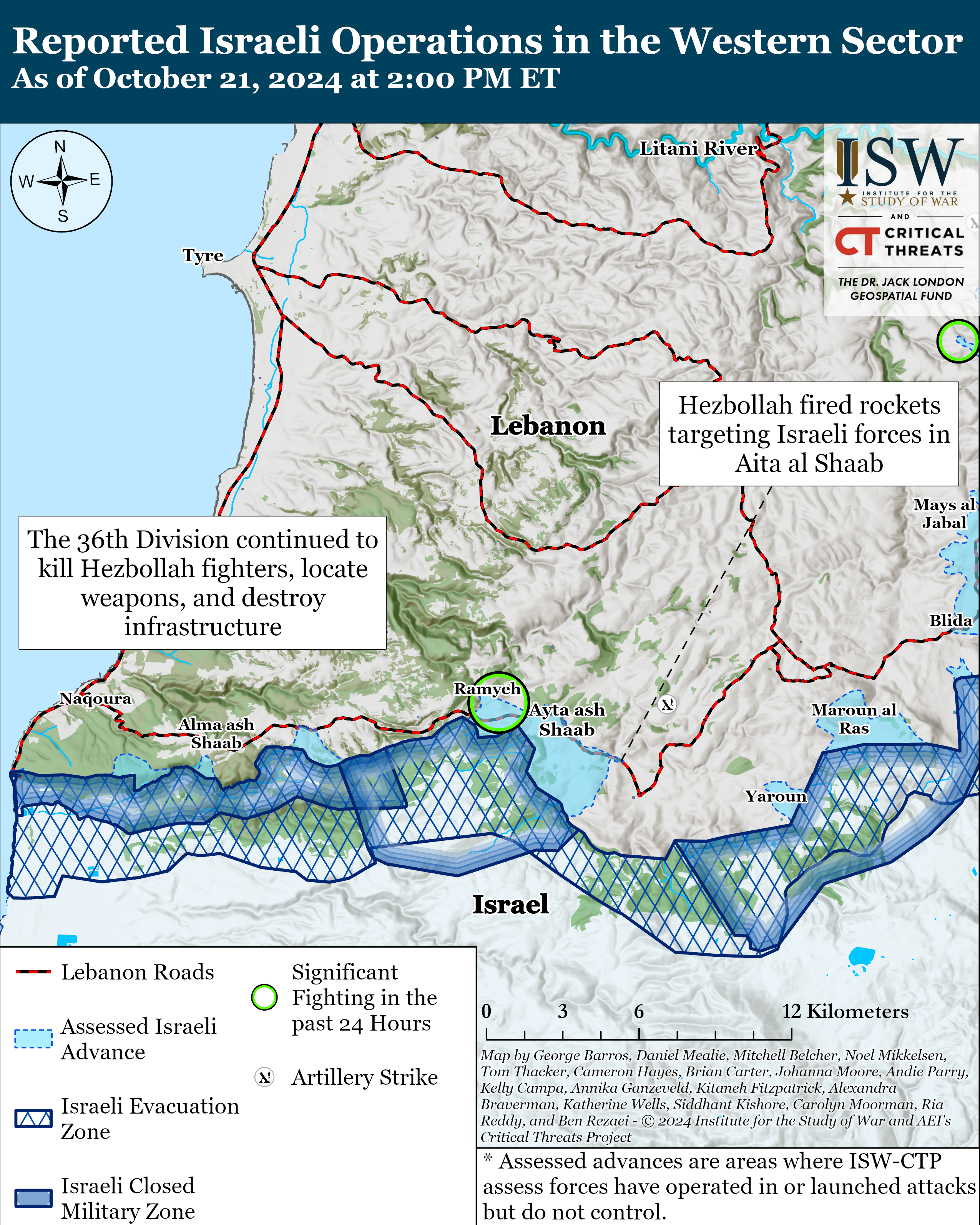
The IDF continued its air campaign to degrade Hezbollah’s capabilities and infrastructure on October 21. The IDF said it struck around 300 Hezbollah targets across Lebanon in the past day, including Hezbollah ammunition depots, launchers, anti-tank positions, and infrastructure.[lxxix] The IDF Air Force struck dozens of launchers aimed at Israel and IDF positions.[lxxx] The IAF also struck 15 short-range missile launchers in southern Lebanon aimed at Israel that Hezbollah used to fire at the Western Galilee.[lxxxi] The IDF conducted a strike on a launcher that Hezbollah fighters used to target central Israel.[lxxxii] The IDF said the launcher was prepared to launch again.[lxxxiii] The IDF aims to disrupt Hezbollah’s capabilities to strike Israel.
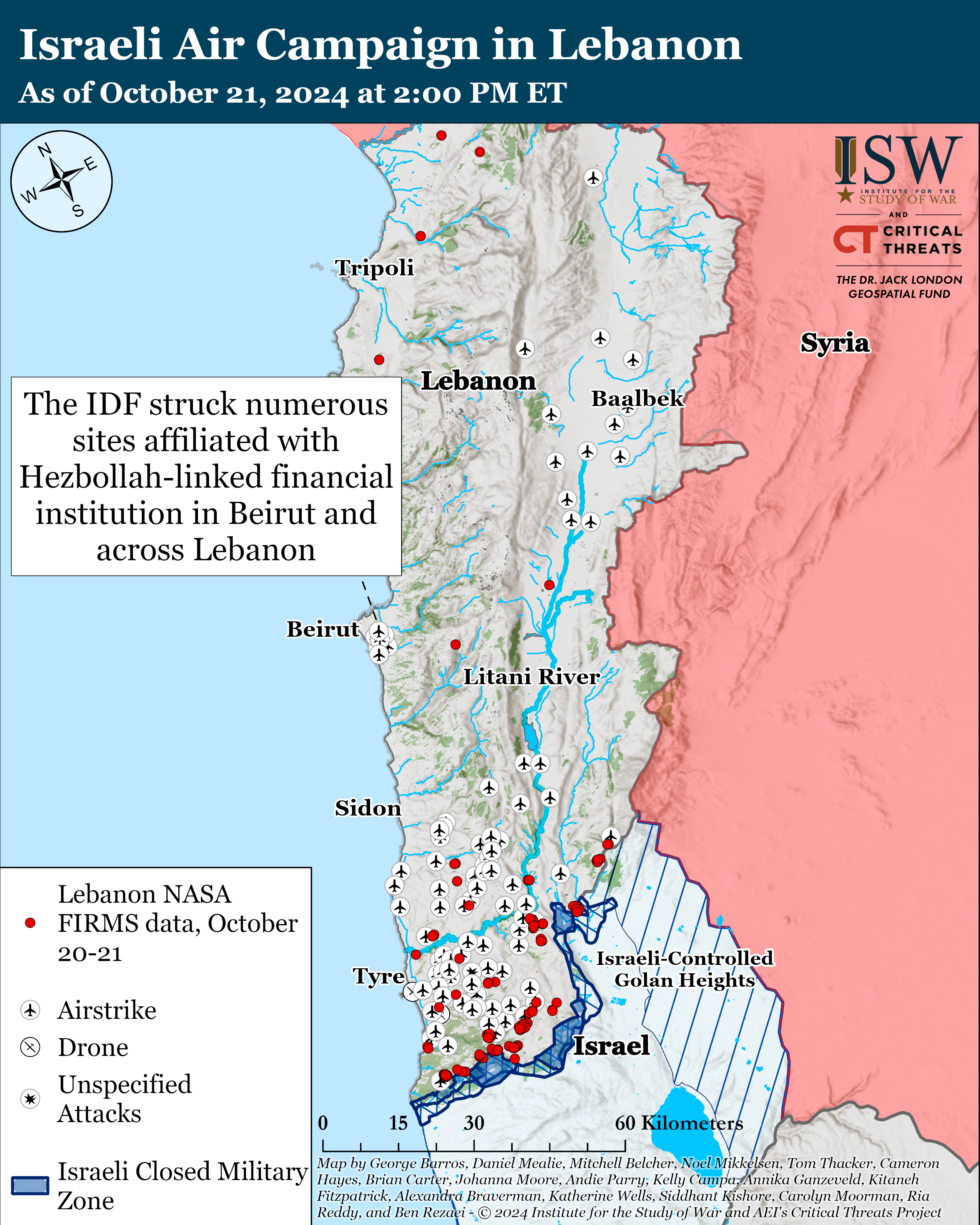
This map illustrates individual Israeli air and artillery strikes based on local Lebanese reporting. This map depicts strikes reported from 2:00pm ET on October 20 to 2:00pm ET on October 21. This map is not exhaustive. CTP-ISW cannot independently verify the locations of Israeli strikes.
Hezbollah conducted at least 16 rocket and drone attacks into northern Israel since CTP-ISW’s last data cutoff on October 20.[lxxxiv] The IDF intercepted five drones over the Mediterranean Sea before they crossed into Israeli territory on October 21.[lxxxv] Israeli Army Radio stated the drones were launched from Lebanon.[lxxxvi] Hezbollah continued to target civilian sites in northern Israel including Kiryat Shmona, Karmiel, Ma’alot Tarshiha and Kabri.[lxxxvii] Hezbollah continued to target IDF personnel in towns on the Israel-Lebanon border including Zarit and Shomera.[lxxxviii] Hezbollah launched rockets targeting an IDF artillery position in Odum in the Golan Heights for the first time.[lxxxix] Hezbollah launched drones at Israeli forces in the Yiftach Barracks.[xc]
The Israeli Airports Authority briefly suspended flight takeoffs from Ben Gurion Airport near Tel Aviv, possibly due to a ballistic missile interception over northern Israel on October 21. The Israeli Airports Authority said that it suspended flights due to unspecified security concerns, but Israeli media reported the suspension occurred following a ballistic missile interception in northern Israel.[xci] No militia group has claimed a ballistic missile attack targeting Israel at this time.
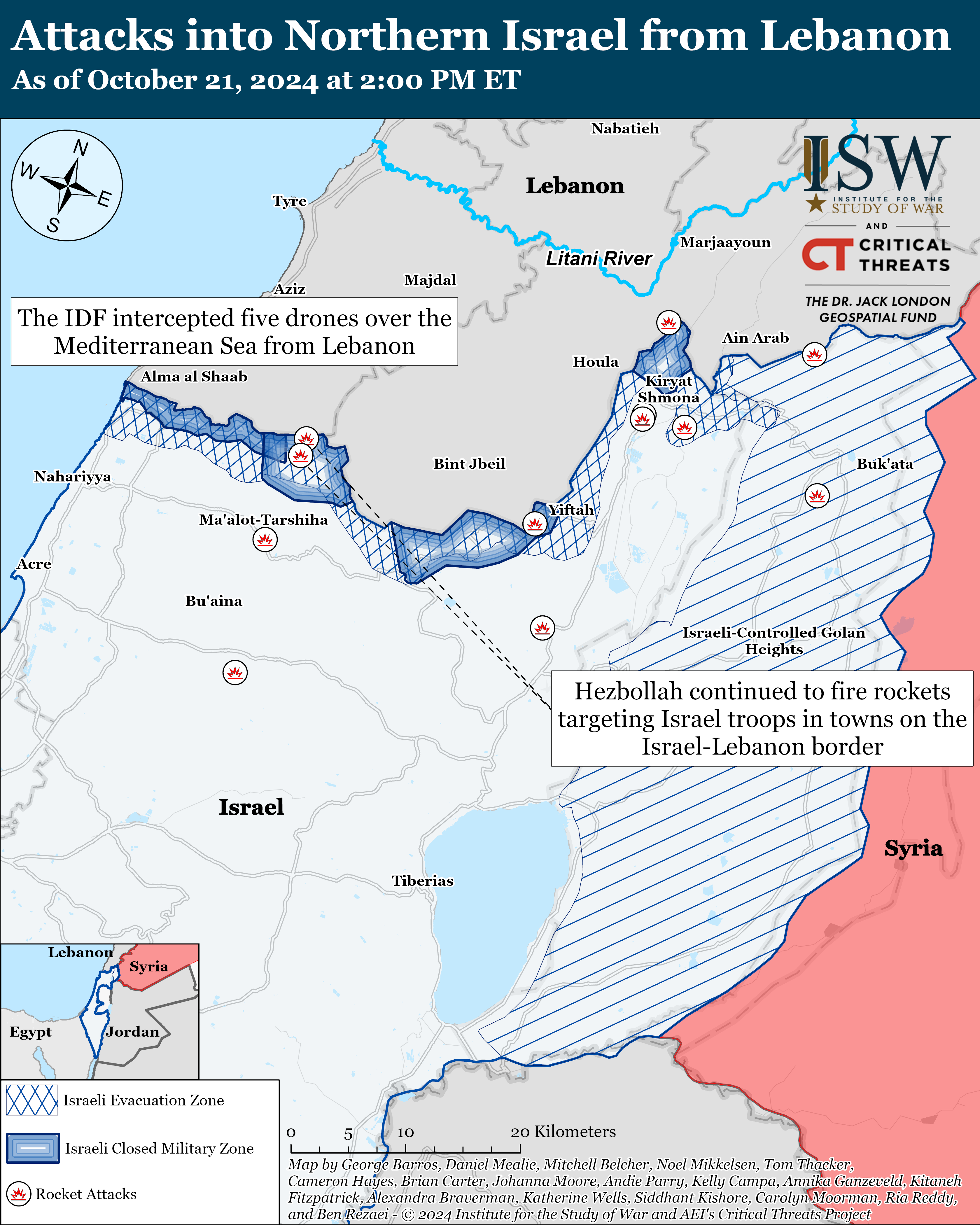
Iran and the Axis of Resistance
The Islamic Resistance in Iraq—a coalition of Iranian-backed Iraqi militias—has claimed three attacks targeting Israel since CTP-ISW’s last data cutoff on October 20.[xcii] The claims include the following:
- A drone attack targeting an unspecified “vital target” in the Golan Heights.[xciii] The IDF Air Force intercepted the drone in Syrian airspace before it entered Israeli airspace.[xciv]
- A drone attack targeting an unspecified “vital target” in the Jordan Valley.[xcv] An Israeli media correspondent reported that the IDF Air Force intercepted the drone.[xcvi]
- A drone attack targeting a military target in the Golan Heights.[xcvii]
Iran hosted a joint maritime exercise in the north Indian Ocean from October 19-20.[xcviii] The Artesh Navy, IRGC Navy, Russia, Oman, Saudi Arabia, India, Thailand, Pakistan, Qatar, and Bangladesh participated in the exercise known as the Indian Oceans Naval Symposium Maritime Exercise 2024.[xcix] The exercise involved maritime fighting drills, search operations, oil spill prevention, control.[c] The exercise ended with a naval parade of participating units followed by Iran’s Jamaran destroyer. Iranian Artesh Navy Commander Admiral Shahram Irani said that the exercise demonstrated Iran’s involvement in the region.[ci] IRGC Quds Force Coordination Deputy Brigadier General Eraj Masjedi stated that the exercise showed that the Iranian armed forces are always at ”full readiness.”[cii]
Iranian Foreign Affairs Minister Abbas Araghchi met with senior Turkish officials in Istanbul, Turkey, on October 18.[ciii] Araghchi discussed opportunities for expanding bilateral trade, tourism, and counterterrorism cooperation between Iran and Turkey during his meeting with Turkish President Recep Tayyip Erdogan.[civ] Araghchi emphasized the need for Turkey to “make decisions and implement urgent measures” to confront Israel.[cv] Araghchi separately held a joint press conference with Turkish Foreign Affairs Minister Hakan Fidan to discuss bilateral security and economic cooperation and regional tensions.[cvi] Iranian Foreign Affairs Ministry Spokesperson Esmail Baqaei stated that Araghchi will travel to Bahrain and Kuwait starting on October 21.[cvii]
Iranian President Masoud Pezeshkian will travel to Kazan, Russia, on October 22 to attend the two-day BRICS summit and meet with the presidents of Russia, China, India, and Egypt.[cviii] Pezeshkian is also expected to sign a new 20-year cooperation agreement with Russian President Vladimir Putin aimed at deepening the pre-existing Russo-Iranian strategic partnership, although the full details of this agreement are not yet public.[cix] Pezeshkian will also participate in meetings with leaders from the “BRICS and the Global South” bloc, aimed at strengthening multilateralism and countering Western influence.[cx]

View Citations
